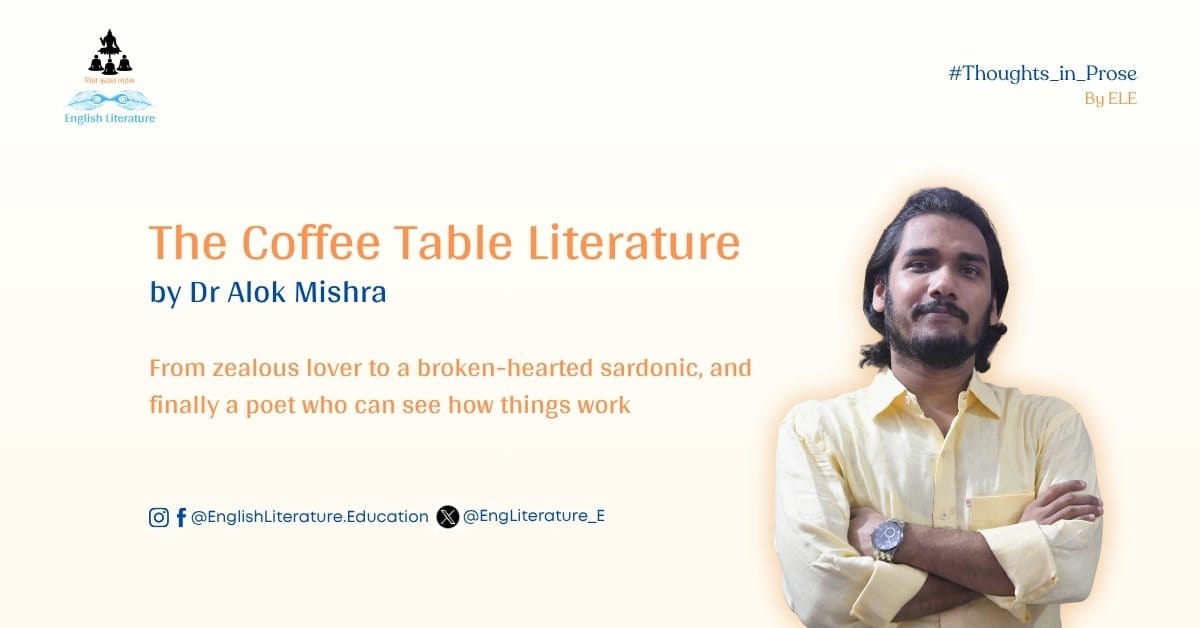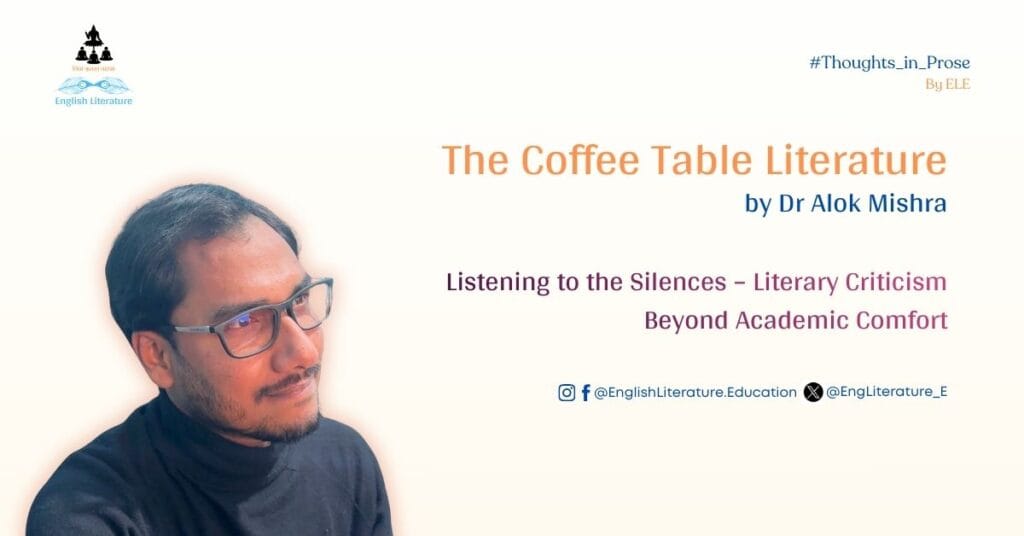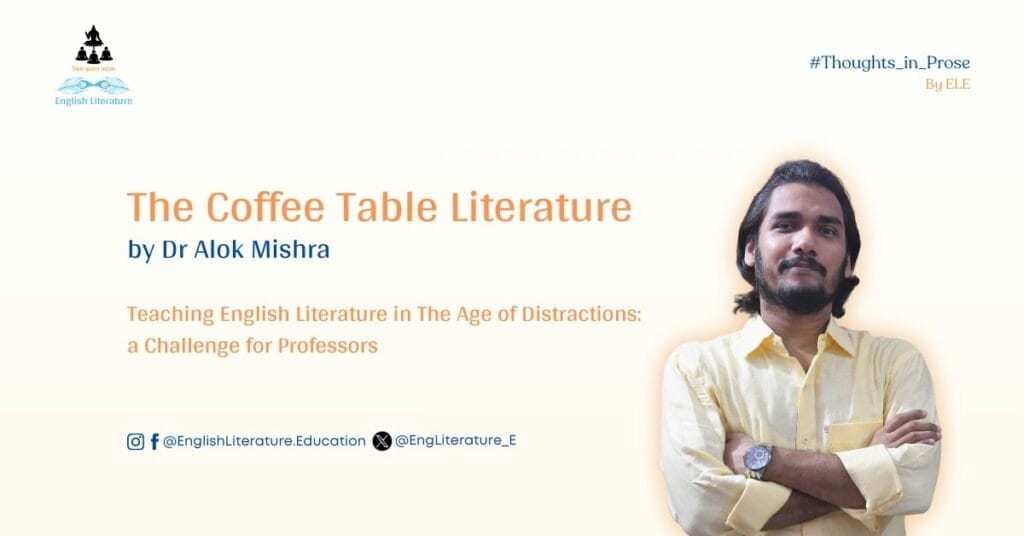I may be damned for saying so, but why is it that the trajectory of poetry starts with an illusion of love, delusionally peaks with the heartbreak and matures with a realisation that poetry is far too important to be invested in individual pleasure or suffering. Indeed, poetry seems to mimic the patterns of life. At first, one is enchanted by beauty, captivated by desire, and overwhelmed by longing. The early poems of many legendary writers brim with the naivety of first love and the earnestness of wanting to capture it. And yet, as the muse betrays or disappears, the poet discovers new rhythms—not of the heart alone, but of the universe.
In the life of a poet, there emerges a pattern, a quiet but undeniable trajectory that parallels the development of human consciousness itself. The youthful indulgence, the heartbreaks that shape early verse, and the eventual transcendence into a realm of philosophical or even metaphysical musings form a route many a poet has taken over centuries. From zealous lover to a broken-hearted sardonic, and finally a poet who can see how things work… This rhapsody, seemingly casual, conceals layers of depth and insight into the evolving nature of poetic engagement with the world. It implies a stage of reflection where the poet, now weathered by experience and no longer dictated by emotional flux, sits back with a coffee in hand and observes. But this observation is not idle; it is seasoned with insight, tempered by pain, and enlivened by hope.
The creator of the universe must have thought deeply before bestowing an equal power of creation to the poets. Do we doubt the judgment of the one who initiated the interminable flow of the divine universe? Believe me, poets are the empowered lot who enjoy the prowess to create many universes within this impenetrable universe. This power, however, comes with a shared sense of responsibility that the wordsmiths must not forget. This, perhaps, is the greatest realisation a poet can have that their words are not simply vessels of expression but instruments of change, illumination, and spiritual resonance. Unlike mere chroniclers of romantic misadventures or plaintive souls lost in longing, poets, when awakened to this responsibility, assume a role closer to that of sages, prophets, or visionaries.
Unlike my learned ancestors, I do not believe that poets merely pardon us with an escape from the mundane of this world. They also show us the possibilities and hint at the best resolutions. T. S. Eliot’s resounding faith in the Hindu Upanishads and Sri Aurobindo’s lofty ideals, he expected poets to achieve, will keep telling us that poets are way beyond the beauty-struck romantic jingoists ready to die celebrating the breasts and eyes of women! Savitri’s celebration of womanhood or Sylvia Plath’s explorations of the multifaceted woman’s psyche will often come to the forefront when pitted against the red, red rose and a woman walking in beauty. The comparison is neither designed to undermine the lyrical sweetness of romantic poetry nor to ridicule the emotional vulnerability of young lovers. Rather, it seeks to call attention to the deeper possibilities of poetic labour.
A poem must, at some level, strive to transcend. Whether it rises from the ashes of love or the debris of trauma, it must eventually seek a language that heals, questions, provokes or redeems. The poetic imagination, once freed from its personal moorings, becomes a site of inquiry into the eternal. Sri Aurobindo’s Savitri does not merely depict a woman’s love for her husband; it symbolises the yogic ascension of consciousness, the spiritual journey of the soul. Sylvia Plath’s introspective verse is not just the cry of a disturbed woman but a revelation of the fractured female identity in modern patriarchal societies. This is the evolution that poetry offers, from love sonnets to ontological quests, from private sighs to universal truths.
I am not at all against poets singing their love ballads or wooing their women with words. Understand me, readers. I am merely trying to draw a line that differentiates between what remains permanent and what washes away like the golden quotes written on the sand before the ocean. What kind of poet would you want to become? The question is rhetorical and reflective, aimed at every aspiring poet who stands at the crossroads of self-indulgence and self-realisation. If poetry is to endure beyond the moment, it must engage with what is perennial, not merely what is personal. There lies the difference between writing to soothe a broken heart and writing to stir the slumbering conscience of a generation.
In my humble opinion, I believe that poets learn with time. The evolution is not rapid, but rather eventual. The penance of words gradually fruits in a realisation that there is nothing to be sung or mourned in this world. It is often one’s reaction to the destiny unfolding in the vicinity of one’s intellectual and emotional periphery. When the reaction meets verse and rhythm, poetry happens. Therefore, the choice remains with the very able poet. What would you react to? It is in this moment of choice that the poet becomes more than a writer. The choice of reaction, whether to a lost love, a societal injustice, an existential dilemma or a metaphysical question, defines the poem. Reaction is not merely a response; it is a transformation. When raw emotion is passed through the sieve of insight, what emerges is poetry. And not just poetry, but literature that echoes through time.
There is something deeply spiritual, almost monastic, about this evolution of the poet. The world often romanticises the poetic lifestyle, its melancholy, its bohemian freedom, and its isolation. However, those who tread its true path know that poetry is less about escape and more about endurance. It is an extended meditation, a rigorous self-reflection, and a constant tuning of one’s sensitivity to the subtle vibrations of the world. This is why great poetry rarely occurs in abundance. It is not mass-produced. It is distilled over time, matured through contemplation, and often forged in the midst of pain.
The literary history of the world is filled with examples of poets who began with enchantment and ended with enlightenment. Wordsworth moved from the emotional exuberance of the Lyrical Ballads to the philosophical grandeur of The Prelude. Rabindranath Tagore’s poetic journey carried him from romantic Bengali verse to the spiritually rich Gitanjali. Even T. S. Eliot, once the modernist lamenter of spiritual desolation, found resolution in Four Quartets, a work deeply soaked in theological and metaphysical reflection. These transitions were not betrayals of their youthful selves but expansions of their poetic sensibilities.
Yet, poetry today often finds itself caught in a paradox. On the one hand, the digital world has democratised access to poetry. Anyone with a device and an emotion can write and share their thoughts. On the other hand, the depth of poetry often suffers. The metrics of likes and shares cannot replace the echoes of silence a poem creates in a contemplative mind. Amidst this chaos, the mature poet must rise, not to condemn but to contribute. To write poems that are not disposable thoughts but enduring reflections.
Perhaps the most critical realisation is that poetry is not about poets alone. It is about readers, cultures, histories, and futures. A poet must write with the awareness that their words might outlive them, shape someone’s understanding of beauty, or ignite a movement. The responsibility of creation is not to be taken lightly. When poets understand this, their work ceases to be merely expressive. It becomes expansive. Their poetry stops being a mirror and starts becoming a lamp.
Let us then respect all phases of the poetic journey—the naive beginnings, the passionate heartaches, the bitter awakenings. But let us also urge our poets to travel further, to write not only about what they feel but about what they understand. To move from surface to soul, from pleasure to purpose. For poetry is not the destination of emotion but the pilgrimage of consciousness.
In the end, the question that matters is not how much poetry one has written or how many metaphors have been coined. The question is: have you realised the power of your verse? Have you used it not just to mourn but to illuminate? Have you chosen to react not only to love but also to life, in all its painful and profound dimensions?
The choice, always, is the poet’s. The consequence, inevitably, belongs to us all.
..
Dr Alok Mishra
for English Literature Education
..
.




1 Comment. Leave new
This analysis reflects on the evolution of poetry and the poet’s role in society. It argues that true poetry transcends personal emotion to engage with universal truths and enduring themes. While early poetic expressions may begin with love or sorrow, maturity brings deeper reflection, purpose, and spiritual insight. Great poets transform raw emotion through wisdom, creating lasting impact. In today’s digital age, where poetry risks becoming shallow and fleeting, the poet must rise with responsibility—to stir conscience, inspire, and enlighten. Ultimately, poetry is not mere expression but a journey of awareness, shaping both the poet’s soul and the collective human experience. It will help amateur writers and literature lovers to start his journey.